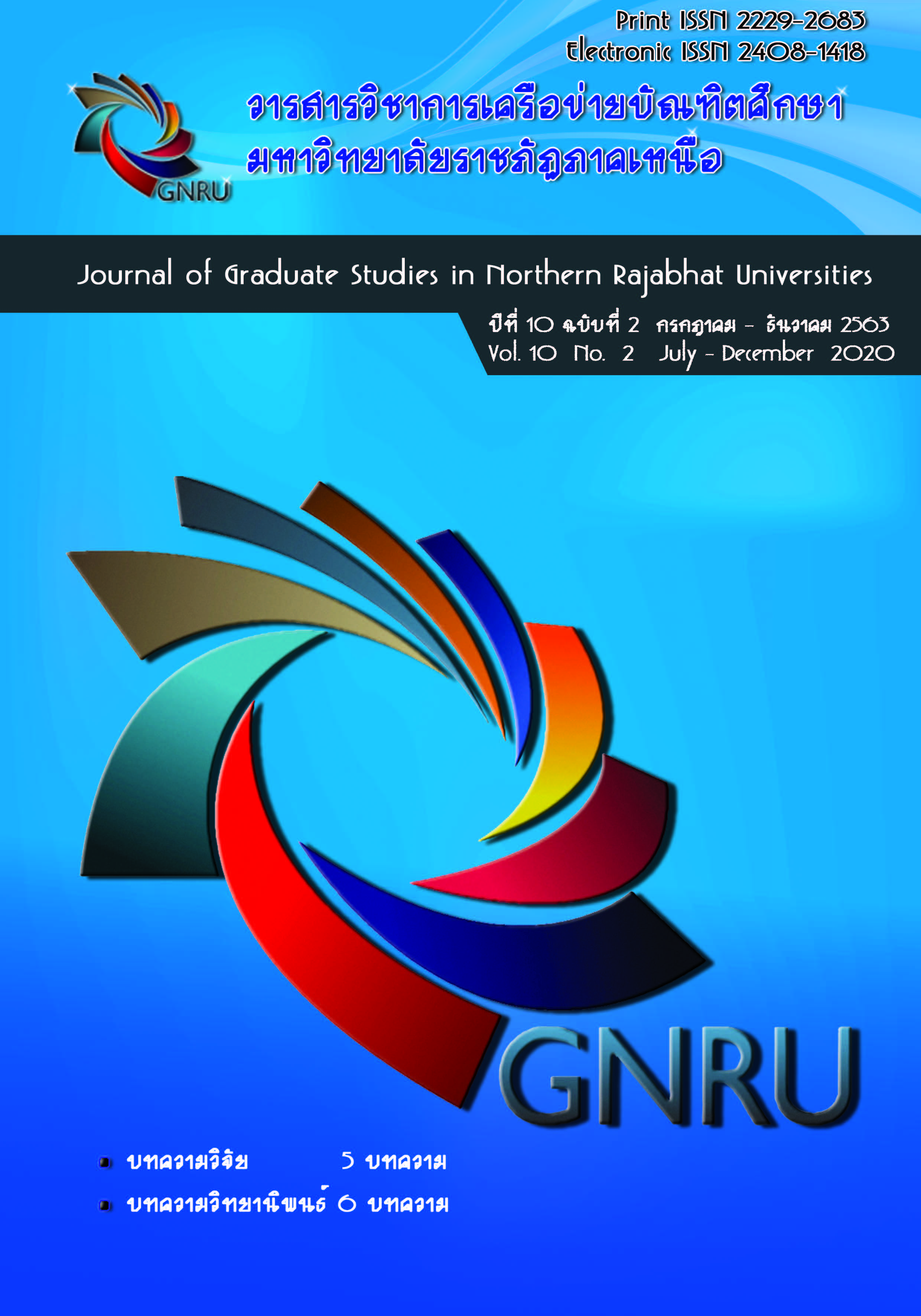การพัฒนาการคิดเชิงคณิตศาสตร์ เรื่อง เรขาคณิตวิเคราะห์ ของนักเรียนแผนการเรียนวิทยาศาสตร์ ชั้นมัธยมศึกษาปีที่ 4 ด้วยการจัดการเรียนรู้ตามขั้นการปฏิบัติ 5 ขั้น ของสไตน์ที่เน้นการอภิปรายทางคณิตศาสตร์ The Development of Mathematical Thinking on Analytic Geometry Topic of Tenth Grade Students in Science Program through Five Practice Model of Stine for Orchestrating Productive Mathematics Discussions
Main Article Content
Abstract
การวิจัยครั้งนี้มีวัตถุประสงค์ เพื่อเปรียบเทียบคะแนนการคิดเชิงคณิตศาสตร์ หลังการจัดกิจกรรมการเรียนรู้ตามขั้นการปฏิบัติ 5 ขั้น ของสไตน์ที่เน้นการอภิปรายทางคณิตศาสตร์ เทียบกับเกณฑ์ร้อยละ 70 ของคะแนนเต็ม และเพื่อศึกษาพัฒนาการของการคิดเชิงคณิตศาสตร์ระหว่างวงจรปฏิบัติการทั้ง 5 วงจรปฏิบัติการ กลุ่มเป้าหมายคือ นักเรียนชั้นมัธยมศึกษาปีที่ 4 แผนการเรียนวิทยาศาสตร์ จำนวน 25 คน ของโรงเรียนวังแขมวิทยาคม จังหวัดกำแพงเพชร ที่กำลังศึกษาในภาคเรียนที่ 2 ปีการศึกษา 2562 การวิจัยปฏิบัติการนี้ใช้เวลาในการจัดการเรียนรู้ทั้งหมด 15 ชั่วโมง เครื่องมือที่ใช้ในการวิจัย ได้แก่ แผนการจัดการเรียนรู้ ใบกิจกรรม และแบบวัดการคิดเชิงคณิตศาสตร์ใช้การวิเคราะห์ข้อมูลด้วย ค่าเฉลี่ยเลขคณิต ค่าเบี่ยงเบนมาตรฐาน การทดสอบทีแบบกลุ่มเดียว และการวิเคราะห์ข้อมูลด้วยเกณฑ์การให้คะแนนแบบแยกประเด็น (Analytic Scoring)
ผลการวิจัย พบว่า นักเรียนมีคะแนนการคิดเชิงคณิตศาสตร์หลังการจัดกิจกรรมการเรียนรู้ ตามขั้นการปฏิบัติ 5 ขั้นของสไตน์ที่เน้นการอภิปรายทางคณิตศาสตร์ สูงกว่าเกณฑ์ร้อยละ 70 ของคะแนนเต็ม อย่างมีนัยสำคัญทางสถิติที่ระดับ .05 ผลการวิจัยจากใบกิจกรรมที่นักเรียนทำระหว่างจัดกิจกรรมการเรียนรู้ พบว่า นักเรียนมีพัฒนาการของการคิดเชิงคณิตศาสตร์ทุกองค์ประกอบ เปลี่ยนแปลงไปในทางที่ดีขึ้น และในภาพรวมอยู่ในระดับดี เมื่อพิจารณาแต่ละด้าน พบว่า ด้านการแก้ปัญหาและการให้เหตุผลอยู่ในระดับดี ด้านการนำเสนอตัวแทนความคิดอยู่ในระดับดีมาก และผลการวิจัยจากแบบวัดการคิดเชิงคณิตศาสตร์ พบว่า นักเรียนส่วนใหญ่มีการคิดเชิงคณิตศาสตร์ในภาพรวมอยู่ในระดับดี เมื่อพิจารณารายด้าน พบว่า นักเรียนส่วนใหญ่มีการคิดเชิงคณิตศาสตร์
ทั้งสามด้านในระดับดี เช่นกัน แสดงให้เห็นถึงการพัฒนาที่สอดคล้องและเป็นไปในทิศทางเดียวกัน
The purposes of this research were to compare learning achievement of mathematical thinking after using the learning management of five practices model of Stein for orchestrating productive mathematics discussion with the criteria of 70% and to study the developing mathematical thinking during the 3 cycles. The research participants were 25 students in tenth grade in sciences program of Wangkhaem Witthayakhom School in the second semester of 2019 academic year. This action research took totally 15 hours. The instruments used in the research were lesson plans, activity sheets, and mathematical thinking test. Data were analyzed by mean, standard deviation, t-test and analytic scoring.
The results were found that the students have mathematical thinking score higher than the criterion of 70 percent at the 0.05 of significant after using five practices model of Stein for orchestrating productive mathematics discussion. The activity sheets which students work during learning management were found that most students have overall mathematical thinking in good level. Each aspect showed that most students have overall problem-solving skill and reasonable skill in good level, but overall mental representation skill was in highest level. The result from mathematical thinking test were also found that most students have overall mathematical thinking in good level. For each subcomponent of mathematical thinking the results showed that most students have mathematical thinking skills in good level. All of these show the consistent development in the same direction.
Article Details
References
สถาบันส่งเสริมการสอนวิทยาศาสตร์และเทคโนโลยี. (2546). คู่มือวัดผลประเมินผลคณิตศาสตร์. กรุงเทพฯ: ศรีเมืองการพิมพ์.
_______. (2555ก). ครูคณิตศาสตร์มืออาชีพเส้นทางสู่ความสำเร็จ. กรุงเทพฯ: 3–คิว มีเดีย.
_______. (2555ข). การวัดและประเมินผลคณิตศาสตร์. กรุงเทพฯ: วี. พริ้น (1991).
วรนารถ อยู่สุข. (2555). การพัฒนาความสามารถในการให้เหตุผลและความคิดสร้างสรรค์ทางคณิตศาสตร์ของนักเรียนมัธยมศึกษาปีที่ 4 โดยใช้ชุดกิจกรรมเสริมหลักสูตรคณิตศาสตร์และวงจรการเรียนรู้เชิงประสบการณ์. วิทยานิพนธ์ปริญญาครุศาสตรมหาบัณฑิต (สาขาวิชาการศึกษาคณิตศาสตร์). จุฬาลงกรณ์มหาวิทยาลัย, กรุงเทพฯ.
รุ่งทิวา นาบำรุง. (2550). วิถีธรรมชาติแห่งการคิดเชิงคณิตศาสตร์เรื่องการคูณและการหารของเด็กที่มีอายุตั้งแต่ 7-10 ปี. วิทยานิพนธ์ปริญญาการศึกษาดุษฎีบัณฑิต (สาขาวิชาคณิตศาสตร์ศึกษา). มหาวิทยาลัยศรีนครินทรวิโรฒ, กรุงเทพฯ.
สุวิมล ว่องวาณิช. (2555). การวิจัยปฏิบัติการในชั้นเรียน. (พิมพ์ครั้งที่ 16). กรุงเทพฯ: จุฬาลงกรณ์มหาวิทยาลัย.
Allen, K. C. (2013). Problems before Procedures: Systems of Equations. Mathematics Teacher, 286–291.
Baroody, A. J., Purpura, D. J., Eiland, M. D., & Reid, E. E. (2015). The impact of highly and minimally guided discovery instruction on promoting the learning of reasoning strategies for basic add-1and doubles combinations. Early Childhood Research Quarterly, 30(2015): 93-105.
Bruner, J. (1960). The process of education. Cambridge, MA: Harvard University Press.
Groth, R. E. (2015). Using the five practices model to promote statistical discourse. Teaching Statistics, 37(1): 13-17.
Lam T.T., Berinderjeet Kaur. (2012). Reason Communication and Connection in Mathematics: Reasoning and Justification in the secondary Mathematics Classroom. Singapore: World Scientific.
Larsson, M. (2015). Orchestrating mathematical whole-class discussions in the problem solving classroom: Theorizing challenges and support for teachers. Mälardalen University, Sweden.
National Council of Teachers of Mathematics. (2000). Principles and Standards for School Mathematics. Virginia: NCTM.
Rickart, C. (1996). Structuralism and Mathematical Thinking. The Nature of Mathematical Thinking. Sternberg. Robert J., & Ben-Zeev, Talia., (Editors). pp. 258 –300. NJ: Lawrence Erlbaum Associates.
Stein, M. K., Engle, R. A., Smith, M. S., & Hughes, E. K. (2008). Orchestrating productive mathematical discussions: Five practices for helping teachers move beyond show and tell. Mathematical Thinking and Learning, 10(4), 313-340.
Stacey, K. (2007). What is Mathematical Thinking and Way is it Important?. [Online]. Retrieved July 26, 2019, from http://www.criced.tsukuba.ac.jp/math/apec/apec2007/progress_report/symposium/Kaye Stacey.pdf
Young, J. S. (2015). Orchestrating Mathematical Discussions: A Novice Teacher’s Implementation of Five Practices to Develop Discourse Orchestration in a Sixth-Grade Classroom. A Thesis Master of Arts degree (Department of Teacher Education). Brigham Young University, United States.


